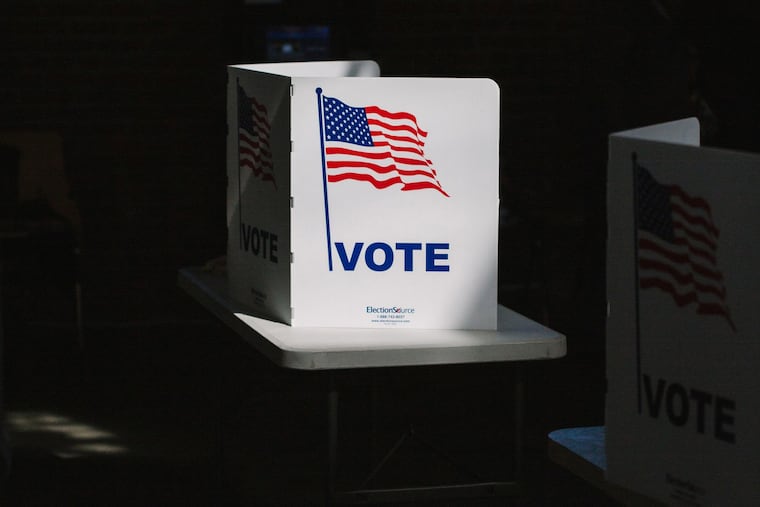Three ways to make Pa. elections more secure and accessible
The May primary was free and fair. Yet there are still ways to shore up public confidence in the system.

Every general and primary election is an opportunity to stress test our democracy. We should feel confident about May’s election, which — thanks to the hard work and dedication of Pennsylvania’s election officials and poll workers — was free, fair, and secure. This was confirmed by the results of the recount process, which finished last month.
But like any good test, it showed us where we can improve: How we can shore up public confidence in our system and make our elections more accessible for all Pennsylvanians. Democracy works better when we earn and hold trust in local election officials, in the integrity of our systems, and in each other.
Here are three ways to bolster the security and accessibility of Pennsylvania’s elections:
Improve the election experience for Pennsylvania voters
Voters expect to see unofficial results on election night, and they are understandably frustrated when that doesn’t happen. It’s important to note that a longer-than-expected wait time for results does not necessarily mean that there’s a problem. Election workers prioritize accuracy and security above all else, and they will always take the time to get it right by counting every vote.
» READ MORE: Pa. primary election set voter turnout records. Here’s what else the data show.
That said, most delays are also preventable and could be solved with simple policy changes.
Pennsylvania is one of only a few states that does not allow local jurisdictions to process mail-in and absentee ballots until 7 a.m. on Election Day. This delays the counting and often means results cannot be determined until the next day — or, as we saw in 2020, even later.
County and city election officials from both parties have advocated increasing the preprocessing period for mail-in ballots to 21 days before Election Day. Other states, such as Florida, experienced similar delays until they updated their laws. Now, Florida voters routinely get results on election night.
Unfortunately, the Pennsylvania legislature has so far refused to listen to our election workers, instead allowing partisanship and bad-faith arguments to block this commonsense improvement.
Increase election funding
U.S. elections are chronically underfunded, and Pennsylvania is no exception, where counties are responsible for the cost of running federal, state, and local elections. Yet local election officials often operate on shoestring budgets, unable to depend on consistent support from the state or federal government for the staff and equipment required to run an election.
» READ MORE: Fights over Pa. election rules that seemed settled after 2020 have now come roaring back
Dependence on outside money is not a perfect solution, but U.S. lawmakers are responsible for ensuring our democracy is adequately supported, and they have been largely absent. In 2020, Congress provided $825 million for elections nationwide — a fraction of what experts say is necessary. One estimate puts the figure at $20 billion over the next decade.
New cyber threats are always emerging, so we need consistent funding, both to maintain existing protections and to get ahead of new threats.
Regular state and federal funding would help Pennsylvania remain vigilant against both internal and external threats, even outside of the election season. Nothing is worth investing in more than our democracy.
Protect election workers
Our human infrastructure is just as important as voting hardware and cybersecurity. Election workers are essential workers.
But they have become targets for threats that are fueled by disinformation about the 2020 election. Reuters found that more than 850 election workers across the country have received threatening messages. In Pennsylvania, election officials from both parties — from cities and rural counties all over the state — were victims of this intimidation. One of us has even had our family’s lives threatened.
Law enforcement has taken steps to protect state officials who receive threats, monitoring their homes and workplaces. The U.S. Department of Justice has also taken the lead with its election worker threat task force. This task force is a good start, but more resources are needed for law enforcement training and coordination at all levels. Violent threats need to be taken seriously, and perpetrators must be held accountable to deter further attacks.
Pennsylvania is known as the cradle of liberty, but that’s a responsibility as much as it is an honor. We must continue to work to ensure our elections are worthy of that distinction, and that the place where American democracy worked first is also the place where it continues to work best.
Leigh Chapman, a Democrat, is the acting secretary of state of the Commonwealth of Pennsylvania. Al Schmidt, a Republican, is a former city commissioner of Philadelphia. Both are part of Issue One’s Faces of Democracy campaign, a bipartisan group of election officials and poll workers advocating for strong and safe elections.